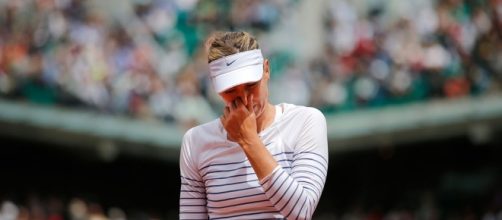It seemed like only yesterday when Russian tennis ace Maria Sharapova returned to the sport after a reduced two-year ban for testing positive of the controlled substance meldonium.
At first, she seems to have hit the ground of competition running, as evidenced by her comeback performance match at the Porsche Grand Prix in Stuttgart. Her wildcard entry into this tournament was frowned on by some of her fellow players, including Canada’s Eugenie Bouchard, who then stopped her former idol’s momentum cold at the later Madrid Open.
From there, it seems that Sharapova’s return to tennis had run out of steam, especially when a Grand Slam Major, the french open, declined to give her a wildcard entry to play.
Haunting error
The refusal of a French Open wildcard for Maria Sharapova was a severe blow to her prospects of rebuilding her world ranking after 15 months of being banned. Her best bet at doing so was to get somehow tournaments to accept her as a wildcard entry despite not having played at all at the beginning of the year. But now the French Open, which she had been a champion of twice in the past, has turned her down. What’s worse, the reason cited was her recent ban.
From a Facebook Live broadcast by French Tennis Federation president Bernard Giudicelli, he laid out why the French Open cannot give Sharapova this much despite her previous achievements in this major tournament. "If there can be a wildcard for return from injuries then there cannot be a wildcard for return of doping,” said Giudicelli.
He understands that Sharapova and her loyal fans must be disappointed, but adds, "I'm very sorry for Maria, very sorry for her fans….it's my mission to protect the game and to protect the high standards of (the) game played without any doubts on the result."
Mistake by oversight
No thanks to her doping ban, Maria Sharapova’s rating in the Women’s Tennis Association ranking is presently at number 211. She had hoped that a better turnout at the Porsche Grand Prix would have given her ranking enough of a boost to enter the French Open by merit.
Her semifinal loss to Kiki Mladenovic left her dependent on a wildcard to get in that Grand Slam. When asked by reporters about how she felt after the FTF decision shutting her out, Sharapova was subdued in replying, "Nothing is a disappointment after being away from the game for 15 months."
Sharapova, who is magnesium-deficient, had been taking meldonium as medication for ten years before the substance was added to the banned list, which she failed to check before competing in the 2016 Australian Open, an oversight that led to her ban. While the French Open is out, Sharapova is still up for qualifying tournaments to another Grand Slam, Wimbledon.


